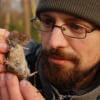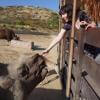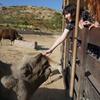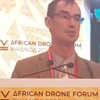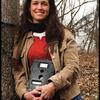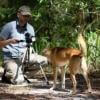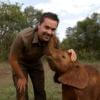Sensors already equip a range of tools to enhance monitoring capacity for conservation. Some of the higher bandwidth technologies, like camera traps and acoustic monitoring systems, have been essential elements of the conservation toolkit for decades, and thus have enough users that we've created dedicated WILDLABS groups to address them. But a whole range of lower bandwidth sensors beyond these core technologies are being increasingly integrated into conservation monitoring systems, and offer rich new insights into the wildlife and ecosystems we're all working to protect. As with many technologies, cost and access have historically been challenges to the adoption of new sensors, but with low-cost and open-source solutions on the rise, we're excited to see what the future of this space holds.
Getting Started with Sensors:
- Watch Shah Selbe's Tech Tutors episode on scaling FieldKit, an open-source conservation sensor toolbox, from a project to a successful conservation tech product.
- Check out our Virtual Meetup about Low-Cost, Open-Source Solutions in conservation tech, including a talk by Alasdair Davies on the Arribada Initiative's work with thermal sensors in early warning systems.
- For a more in-depth introduction, watch the first video in our datalogger mini-series: Freaklabs: How do I get started with Arduino?
In this group, you'll meet others who are using and innovating diverse sensors in their work, discuss ways to make sensors more effective & accessible for conservationists, learn about what sensors are already helping us accomplish in the field, and have the opportunity to ask and answer questions. Join this group to get started!
Header image: Emma Vogel, University of Tromsø
No showcases have been added to this group yet.
Samantha is a founding member and runs the Kelp Forest Foundation which looks to fill the gaps in the science around kelp cultivation.
- 0 Resources
- 1 Discussions
- 1 Groups
Wildfowl & Wetlands Trust (WWT)
Technological support in WWT's Conservation Evidence Department - recently made redundant
- 0 Resources
- 2 Discussions
- 5 Groups
University of Melbourne
- 0 Resources
- 4 Discussions
- 7 Groups
Retired engineer, with long term interest in ecology and all things tech.
- 0 Resources
- 1 Discussions
- 6 Groups
World Wide Fund for Nature/ World Wildlife Fund (WWF)
- 0 Resources
- 0 Discussions
- 8 Groups
- 0 Resources
- 1 Discussions
- 1 Groups
CSIR-Central Scientific Instruments Organisation
- 0 Resources
- 1 Discussions
- 2 Groups
- 0 Resources
- 2 Discussions
- 10 Groups
- 0 Resources
- 0 Discussions
- 8 Groups
Columbia University
Graduate Student in the department of Anthropology
- 0 Resources
- 0 Discussions
- 12 Groups
- 0 Resources
- 3 Discussions
- 3 Groups
- 0 Resources
- 6 Discussions
- 4 Groups
Article
How does tracking technology meet the many challenges specific to monitoring birds within their home ranges and over long distances during migration? WILDLABS community member Virginie Perilhon from Xerius Tracking...
23 April 2020
Article
At the 2018 London Illegal Wildlife Trade Conference, we announced the WILDLABS Tech Hub, an accelerator programme created to support the development and scaling of groundbreaking technological solutions addressing the ...
13 April 2020
In the third part of his series of case studies focusing on preventing human-wildlife conflict within communities, Aditya Gangadharan looks at how one village in North Bengal maximised the potential of an early alert...
10 April 2020
The Monterey Bay Aquarium Research Institute's MARS ocean observatory may someday make conducting deep-sea research more accessible and affordable thanks to Deep-Sea Connect, their new wireless system engineered to ...
31 March 2020
Community Announcement
Our second WILDLABS Community Call took place on April 1st to continue the discussion started by Ben Tregenna in our Data Science group, in which he suggested the idea of submitting a collaborative entry to the X-Prize...
30 March 2020
Trapped inside during the COVID-19 quarantine and looking to engage with conservation science without leaving your desk? Citizen science projects like those on Zooniverse offer a great opportunity to impact scientific...
18 March 2020
Machine learning is rapidly expanding as a useful field research tool, but its complexity can intimidate even seasoned tech conservationists. Edge Impulse aims to make machine learning solutions accessible,...
16 March 2020
Article
Aditya Gangadharan's latest case study looks at how sensor technology can provide solutions for human-wildlife conflict instances along the Indo-Bhutan border. This project, which aimed to get the local community...
11 March 2020
Using technology in the field allows us to innovate new solutions to very old problems like human-wildlife conflict, but are you giving enough consideration to how your high-tech tools fit into long-term plans? Before...
9 March 2020
2020 marked our fifth year holding our annual #Tech4Wildlife Photo Challenge, and our community made it a milestone to remember. Conservationists took to Twitter last week to share their best high-tech snapshots from...
4 March 2020
The 2020 Tusk Awards are now accepting nominations of outstanding individuals who have made a significant impact on conservation in Africa. These nominations offer the rare and exciting opportunity to honor your peers...
3 March 2020
Are you ready for the Plastic Data Challenge? This global contest wants your innovative ideas for improving the plastic waste management and recycling chain in South and Southeast Asia. Participants can consider...
3 March 2020
August 2025
event
September 2025
event
March 2026
July 2021
December 2020
June 2020
17 Products
Recently updated products
121 Products
3 R&D Projects
84 Organisations
Recently updated products
Recently updated R&D Projects
Recently updated organisations
| Description | Activity | Replies | Groups | Updated |
|---|---|---|---|---|
| Have you ever wanted to get a sample from the top of a tree, without having to climb it or shoot it out with a shotgun? Would it... |
|
Sensors | 4 years 9 months ago | |
| Hello Rob, I have seen the bracelet style used on large mammals with mixed success and failure. The main considerations are terrain the animal uses, and fitting the bracelet... |
|
Sensors | 4 years 9 months ago | |
| Amazing stuff Andrew! The dips in light idea made me think of exoplanet hunting straight away! Such a cool idea!! |
|
Sensors | 4 years 10 months ago | |
| Hi Akiba No worries, thanks for responding! I'd love to delve into more detail on this once the new series has started and I have an idea of the tools and kit required!... |
|
Open Source Solutions, Sensors | 4 years 11 months ago | |
| Hi Maxine, There are pros and cons to switching regulators and linear regulators. Linear regulators "throw away" the excess voltage in order to maintain a... |
|
Open Source Solutions, Sensors | 4 years 11 months ago | |
| Hi. I've been following the opencollar initiative and was wondering what the current status is. The project looks amazing! |
|
Sensors | 5 years ago | |
| Hi all, Some ETAG rfid-readers developped by Eli Bridge et al. are now avaible at https://www.labmaker.org/collections/earth-and-ecology/products/etag. The price is high,... |
|
Sensors | 5 years ago | |
| Hi all, Some ETAG rfid-readers are now avaible at https://www.labmaker.org/collections/earth-and-ecology/products/etag. The price is high, though: USD139. Yvan |
|
Sensors | 5 years ago | |
| I'd love to chat more! I'll be reaching out soon! |
|
Sensors | 5 years 1 month ago | |
| Yes im hoping the power bank and a few extra mp3s will get it done this year. will look into a better system this winter now that I have some help:) |
|
Sensors | 5 years 3 months ago | |
| Please see my edits above |
+4
|
Sensors | 5 years 3 months ago | |
| We are developing a Raspberry Pi 4 sized SDR --- frequency range 20Mhz-6GHz. Rx Sensitivity around 120 --- higher is possible with some... |
|
Sensors | 5 years 3 months ago |



